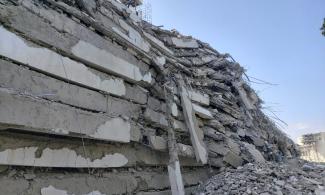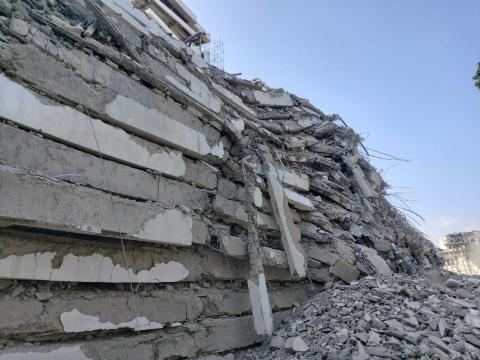
Governmental attitude will only change when the feet of those who frustrate the law are held close to the fire. Should the government be made to pay hefty damages to the families of the dead, enforcement could become tighter. Citizens of Lagos would be the safer should this ever happen.
On February 9, 2021, Olufunsho Elulade, a civil engineer, who had recently been appointed as the general manager of the Lagos State Material Test Laboratory publicly declared that, “The primary function of this agency is to have zero-tolerance on building collapse. Our mandate is to carry out tests on buildings and civil engineering and construction materials so that we can confirm the stability, strength, as well as the structure of any edifice.”
As if he needed to re-assure the assembled journalists that he meant business, The Guardian newspaper reported that Mr. Elulade proceeded to assert that, “At every stage of any construction, we must carry out tests.”
Though his words now ring hollow, in view of the collapse of buildings in Lagos State since his assertions, Mr. Elulade’s agency is nonetheless backed by a law that empowers him to do exactly as he had publicly promised to do: prevent the collapse of buildings in Lagos State.

The relevant piece of legislation, The Building and Civil Engineering (Construction) Materials Law of Lagos State, forms part of the many laws that are on the books of Lagos State. The issue is not one of lack of laws but the lack of enforcement by those who are statutorily and professionally charged with enforcing them. Note that the operative word is “statutorily”.
The news of the collapse of the Fourscore building on Gerrard Road, Ikoyi, Lagos brings up a vital issue that is often sidestepped whenever a structure collapses in any part of Nigeria: the total lack of government’s supervision of building construction sites in Nigeria.
Videos and photographs abound on social media which depict the developer of the Fourscore tower, Femi Osibona, showing prominent elites around the construction site. One of such ill-advised visits was undertaken by the reigning Oluwo of Iwo, Abdulrasheed Akanbi. Decked in a flowing royal agbada complete with a train along with a matching crown, the Oluwo could be seen, in the company of the now deceased developer and a host of his courtiers, on one of the higher floors admiring the building that was still under construction at the time.
Curiously, none of them wore a hard hat or a steel-toe boot or a high visibility vest. There was no sighting of any personal protective equipment (PPE) on any of the many people in the photographs and videos or anywhere near their location during the visit.
None of the videos and photographs that have been making the rounds on social media have, since the unfortunate incident, depicted Mr. Osibona wearing a steel-toe boot while he was at the construction site. It has also been said that a popular gospel singer was taken to the site to sing “praise and worship” songs while work was going on. Photographs of the building show that none of the floor terraces were secured to prevent workers and visitors from falling to their death.
Yet, Mr. Elulade’s agency allowed construction work to continue at the site.
There was much hype about the building in the years and months leading to its collapse. It was billed as the best in its class in Nigeria. High-ranking officials of the Lagos government must have known that many wealthy Nigerians had been paying deposits toward owning units in the building. Units were being sold for at around $1.2 million USD. The news media has widely reported on the fact that prospective owners of residential units in the building were made to pay a deposit of at least $65,000 USD each.
The shoddy management of the construction site and publicly sourced feelers suggest that the depositors may not have protected them against monumental failure such as happened as it has been reported that the deposits may not have been paid to a real estate law firm. In the western world, real estate funds are mandatorily paid to a lawyer to hold in trust pending the closing of real estate transactions as means of securing the deposits. A lawyer’s trust undertakings prevent the release of the funds to the vendor until title to the unit has passed to the purchaser.
Further, it beggars belief that the developer of a mixed-use building of the magnitude of the Fourscore tower did not consider it needful to insure the risks that could potentially result. Here was an individual who had reportedly worked on similar undertakings in the UK and South Africa.
How was he able to get away with no insurance, no PPE, and getting his friends to regularly visit a building that was under construction without being sanctioned? How was he, also, able to fend off the officials of Lagos state who had previously stormed the construction site with a view to sealing it?
This could only have happened in an environment in which there are no laws. But we know that Lagos State indeed has a law that regulates how construction sites are to be managed. We also know that there are at least two agencies tasked with ensuring compliance with the building code in Lagos: Mr. Elulade’s agency and the Lagos State Building Construction Agency whose general manager, Gbolahan Oki, was summarily suspended by the state governor just hours after the collapse.
With two fully staffed state agencies, it should not be a difficult task ensuring that shylocks and “developers-wanna-be” are kept in check. Apparently, government officials in Nigeria cannot be trusted to do simple tasks.
Mr Elulade’s unequivocal declaration, on February 9, 2021, of his readiness to enforce the law raises necessary questions: did his agency carry out tests at every stage of the construction of the Fourscore tower? Or did his agency turn a blind eye because the developer was a well-connected Lagos socialite? Why didn’t his agency shut down the construction site before the calamity occurred?
And having failed to carry out tests “at every stage of [the] construction”, what liability, if any, does the Lagos State government bear? Evidently, the government officials who were tasked with enforcing the law failed to discharge this responsibility.
I argue that the Lagos State government is therefore vicariously negligent in discharging its statutory obligation to monitor builders’ compliance with its building code. I further argue that the government’s negligence in monitoring compliance with the building code brought about the loss of lives with the collapse of the Fourscore tower. A failure to act, where such impacts another’s legal right, is compensable in law. This is because the loss of lives due to the collapse was not only foreseen but was equally predictable. Lagos State is no stranger to collapsed buildings. On November 2, 2021 – the very next day - another structure that was under construction collapsed in Osapa, an area in Lekki.
How much are the lives of its citizens worth in the eyes of the Lagos State government?
Following the collapse of the Fourscore tower, prominent Lagos State officials raced to the site. Even the reportedly stricken Bola Tinubu showed up at the site. None, however, is known to have visited or spoken about the building that collapsed at Osapa, Lekki. It is obvious that in the eyes of the Lagos State government some lives are worth more than others.
A commission has been struck to investigate the cause of the collapse. But, as it is with most government committees, no Lagos citizen reasonably expects the findings of the committee to be publicized or implemented.
Many people have undeservedly died because the state government has been paying lip service to its statutory responsibility imposed on it by its own law. The rule of law exists to resolve the inevitable question: was this calamity preventable? The answer is, in my view, inarguably positive. According to the law of tort, a wrong has been committed against the unsuspecting artisans who worked at the site believing that they were safe. The rule of law indisputably requires that someone has got to pay, and I argue that the Lagos State government should be made to answer for its failure to protect the lowly artisans who died in that tragedy. The government’s failure to compel the developer to abate the nuisance that his construction site had become raises a cause of action that renders damages payable to the victims of the unabated nuisance.
A civil claim that is grounded in negligence should therefore be commenced against the Lagos State government and the developer’s firm by families of the dead. Should the developer’s family contemplate suing the government, it will have to contend with the fact the state government could possibly plead contributory negligence for the developer’s negligent management of his construction site.
Governmental attitude will only change when the feet of those who frustrate the law are held close to the fire. Should the government be made to pay hefty damages to the families of the dead, enforcement could become tighter. Citizens of Lagos would be the safer should this ever happen.
Idowu Ohioze, a lawyer, practices law in Canada and can be reached at: www.andrewlaw.ca.